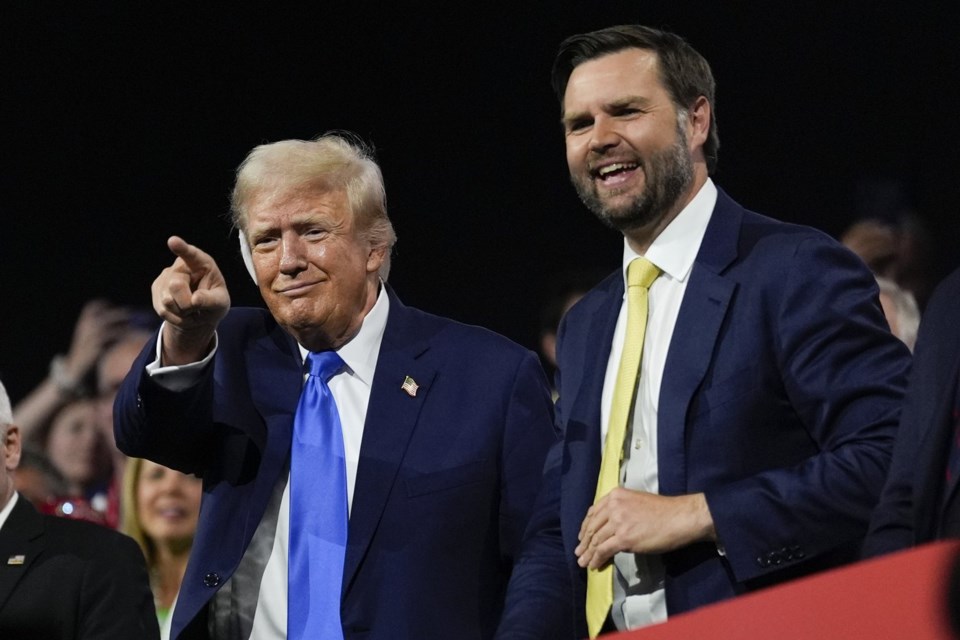MILWAUKEE — Republicans criticized U.S. President Joe Biden's record on foreign policy at the national convention in Milwaukee, as many party faithful called for America to step back from its contributions to the world.
Wednesday's agenda and its theme of "Make America Strong Once Again" will give leaders around the world insight into the potential impact of a second Donald Trump presidency.
"No NATO. I want America strong," said Kimberly Nguyen, wearing a star-spangled dress and draped in a Trump 2024 flag outside the convention.
Trump, who was officially confirmed as the Republican presidential candidate on Monday, has mused about increased tariffs, been critical of aid to Ukraine and repeatedly claimed he would not defend NATO members that don't meet defence spending targets, of which Canada is one.
During a NATO leaders' summit in Washington last week, Prime Minister Justin Trudeau promised to meet the spending target, which is the equivalent of two per cent of gross domestic product, by 2032.
However, he has been criticized for the lengthy timeline and the lack of detail on how Ottawa will make it happen.
Conservative Leader Pierre Poilievre, who is riding high in the polls, would not commit to the alliance's spending target, saying he doesn't make promises he can't keep.
Trudeau faced a push from provincial leaders to speed up the spending timeline during a premiers' meeting in Halifax earlier Wednesday.
Manitoba Premier Wab Kinew expressed concerns that failing to meet the target could jeopardize Canada's trading relationship with the U.S., particularly if there is a change in administration.
Outside the Republican convention, there was little empathy for Canada's defence spending delay. Trump supporter Amy Lee said she supports the defensive alliance, but members must meet their commitments.
"Trudeau, we need you to pay your fair share to NATO," Lee said.
All member countries directly contribute to the alliance's operations at an agreed-upon formula, and Canada pays its required share of that.
Canada is one of about a dozen members that are not reaching the two per cent of GDP threshold for defence spending, though only seven members, including the U.S., spend more than Canada in real dollars.
Top diplomats from around the world are at the convention to make inroads ahead of a possible second Trump presidency and to push Republicans away from some pledges the former president has made about defence alliances and trade.
Kirsten Hillman, Canada's ambassador to the U.S., said some Republicans have an isolationist bent. Many others, she said, understand that “America cannot be strong without having strong alliances.”
“There is no singular voice on foreign policy as it relates to a number of issues at this point in the Republican Party," Hillman said in Milwaukee.
Trump isn't officially scheduled to speak at the convention until Thursday, but has appeared each night of the convention, his right ear covered in a white bandage after it was pierced by a bullet when a man with an assault weapon fired from a rooftop near a rally Saturday afternoon.
A rally attendee was killed and two others critically injured, before the gunman was shot dead by a member of the Secret Service.
Wednesday was the first opportunity for Trump's running mate JD Vance to introduce himself to the world and he used his time to praise the former president, criticize Biden's foreign policy and highlight how disagreements can make the Republican party stronger.
"We will make sure our allies share in the burden of securing world peace. No more free rides for nations that betray the generosity of the American taxpayer," Vance said.
The 39-year-old Ohio senator has built a reputation during his short time in politics for fighting against current U.S. foreign policy and aid to Ukraine.
Vance argued against further funding to the war-ravaged country in a column for the New York Times in April, and told the Munich Security Conference earlier this year that he was there to deliver a "wake-up call" that America's interests must come first.
Trudeau has been one of the most outspoken NATO leaders in support of Ukraine, including at last week's leaders' summit.
Vans with screens on the side were driving around the entrances of the convention Wednesday, displaying calls for Republicans to stand with Ukraine.
The Ukrainian Congress Committee of America, which funded the mobile messaging, said that was intended to remind Republicans that standing with Ukraine helps to defeat America's enemies.
Hillman said Vance has some views on international and domestic policy that do not align with "Canadian values in some circumstances and certainly our government policy in others."
But, she said, Vance represents Ohio, which has a massive trading relationship with Canada. More than a third of the state's exports go to Canada.
“Having someone with that understanding of the importance of the Canada-U.S. economic relationship is a good thing for Canada.”
The vice president pick also has a Canadian connection: Jamil Jivani, the recently elected Conservative MP for Durham, has called Vance his best friend from Yale.
This report by The Canadian Press was first published July 17, 2024.
— With files from The Associated Press and Lyndsay Armstrong in Halifax
Kelly Geraldine Malone, The Canadian Press

